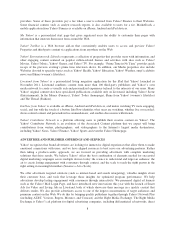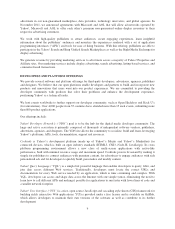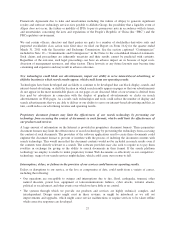Yahoo 2011 Annual Report Download - page 20
Download and view the complete annual report
Please find page 20 of the 2011 Yahoo annual report below. You can navigate through the pages in the report by either clicking on the pages listed below, or by using the keyword search tool below to find specific information within the annual report.are unable to license or acquire compelling content at reasonable prices, if other companies distribute content or
services that are similar to or the same as that provided by us, or if we do not develop compelling editorial
content or personalization services, the number of users of our services may not grow as anticipated, or may
decline, which could harm our operating results.
We rely on the value of our brands, and a failure to maintain or enhance the Yahoo! brands in a cost-effective
manner could harm our operating results.
We believe that maintaining and enhancing our brands is an important aspect of our efforts to attract and expand
our user, advertiser, and Affiliate base. We also believe that the importance of brand recognition will increase
due to the relatively low barriers to entry in certain portions of the Internet market. We have spent considerable
money and resources to date on the establishment and maintenance of our brands, and we anticipate continuing to
spend and devote resources to, advertising, marketing, and other brand-building efforts to preserve and enhance
consumer awareness of our brands. Our brands may be negatively impacted by a number of factors, including
among other issues: service outages; product malfunctions; data privacy and security issues; exploitation of our
trademarks by others without permission; and poor presentation or integration of our search marketing offerings
by Affiliates on their sites or in their software and services.
Further, while we attempt to ensure that the quality of our brands is maintained by our licensees, our licensees
might take actions that could impair the value of our brands, our proprietary rights, or the reputation of our
products and media properties. If we are unable to maintain or enhance customer awareness of, and trust in, our
brands in a cost-effective manner, or if we incur excessive expenses in these efforts, our business, operating
results and financial condition could be harmed.
Our intellectual property rights are valuable, and any failure or inability to sufficiently protect them could
harm our business and our operating results.
We create, own, and maintain a wide array of intellectual property assets, including copyrights, patents,
trademarks, trade dress, trade secrets, and rights to certain domain names, which we believe are collectively
among our most valuable assets. We seek to protect our intellectual property assets through patent, copyright,
trade secret, trademark, and other laws of the U.S. and other countries of the world, and through contractual
provisions. However, the efforts we have taken to protect our intellectual property and proprietary rights might
not be sufficient or effective at stopping unauthorized use of those rights. Protection of the distinctive elements of
Yahoo! might not always be available under copyright law or trademark law, or we might not discover or
determine the full extent of any unauthorized use of our copyrights and trademarks in order to protect our rights.
In addition, effective trademark, patent, copyright, and trade secret protection might not be available or cost-
effective in every country in which our products and media properties are distributed or made available through
the Internet. Changes in patent law, such as changes in the law regarding patentable subject matter, could also
impact our ability to obtain patent protection for our innovations. In particular, recent amendments to the U.S.
patent law will become effective in 2012 and may affect our ability to protect our innovations and defend against
claims of patent infringement. Further, given the costs of obtaining patent protection, we might choose not to
protect (or not to protect in some jurisdictions) certain innovations that later turn out to be important. There is
also a risk that the scope of protection under our patents may not be sufficient in some cases or that existing
patents may be deemed invalid or unenforceable. With respect to maintaining our trade secrets, we have entered
into confidentiality agreements with most of our employees and contractors, and confidentiality agreements with
many of the parties with whom we conduct business in order to limit access to and disclosure of our proprietary
information. However, these agreements might be breached and our trade secrets might be compromised by
outside parties or by our employees, which could cause us to lose any competitive advantage provided by
maintaining our trade secrets.
If we are unable to protect our proprietary rights from unauthorized use, the value of our intellectual property
assets may be reduced. In addition, protecting our intellectual property and other proprietary rights is expensive
and time consuming. Any increase in the unauthorized use of our intellectual property could make it more
expensive to do business and consequently harm our operating results.
18
























